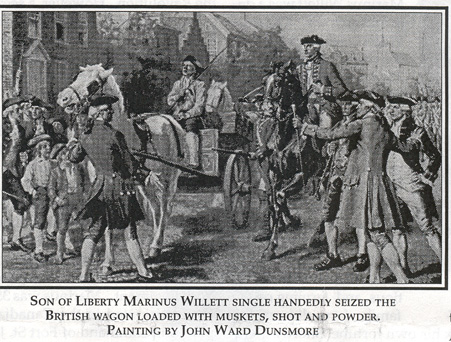
On this day in June 6th, 1775, Marinus Willett and a small group of Sons of Liberty confront British soldiers and seize five wagonloads of weapons as the Redcoats evacuate New York City.
Willet was born in Jamaica, New York, on July 31, 1740. His great-grandfather, Thomas Willett, had been the first English mayor of New York City, a position Marinus would hold as well in the early 1800s. After attending King’s College (now Columbia University), Marinus served as a lieutenant in the Seven Years’ War, joining in the attacks on New York’s Fort Ticonderoga and Fort Frontenac. He ended the war as a patient in the hospital at Fort Stanwix, New York, then under construction.
After his successful capture of British arms on June 6, Willett was commissioned as a lieutenant colonel on June 28, 1775, and participated in the Patriots’ ill-fated Canadian expedition, where he served as the commanding officer at Fort St. John. As colonial ire rose, Willett became a leader of the New York Sons of Liberty, but little is known regarding his activities with the group.
Also during the War for Independence, Willet earned the moniker Hero of the Mohawk Valley for his defense of the site of his earlier convalescence, Fort Stanwix, which guarded the portage path between the Mohawk River and Oneida Lake. Willett and his commanding colonel, Peter Gansevoort, worked to restore the fort to battle-readiness. The British arrived under Colonel Barry St. Leger and laid siege to Gansevoort and Willett’s forces on August 3, 1777.
While the British were away from their siege positions fighting the Tyron County militia en route to relieve Fort Stanwix, Willett led his men in a raid on the abandoned British camp. Although Willett succeeded in absconding with the enemy’s supplies, the British had managed to send the Tyron County militia into retreat. Willett then committed his greatest act of daring when, along with Major Levi Stockwell, he snuck past enemy positions to call for reinforcements. They are remembered for their bravery, although the British ended the siege before reinforcements arrived.

Be the first to comment